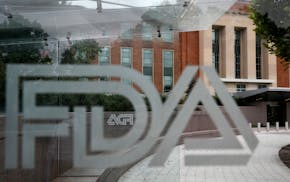Cargill Inc. capped one of its weakest fiscal years in a decade with a particularly lackluster fourth quarter, as falling commodity prices this spring messed with its trading strategies.
The Minnetonka-based agribusiness giant, one of the world's largest privately held companies, on Thursday posted quarterly earnings of $73 million, down 82 percent from a year ago and its worst quarterly showing since the end of fiscal 2001, when it lost $87 million.
For its fiscal year ended May 31, the company had profits of $1.17 billion, down 56 percent from last year's record earnings and below Cargill's own expectations. The year marked Cargill's lowest annual profit since 2003.
An unexpected swoon in commodity prices played a big role in Cargill's fourth-quarter troubles. "Our read of the market was bullish, that prices were going to go up," Cargill Chief Financial Officer Sergio Rial said in an interview with the Star Tribune. But prices went the other way at quarter's end.
"There was a lot of volatility in the month of May," Rial said. "We gave back some of the profits we had generated [earlier] in the fourth quarter."
Volatile markets during the entire year hurt Cargill's trading operation. "We did not trade as well in this year's markets, which were driven as much by the economic and political environment as by the fundamentals," Cargill CEO Greg Page said in a news release.
Judi Rossetti, a debt analyst at Fitch Ratings, said in an e-mail to the Star Tribune that Fitch "is concerned that Cargill's trading results are not transparent and can have a significant impact on Cargill's earnings from year to year."
Fitch's long-term rating on Cargill's publicly traded debt is a solid "A," but the firm revised its Cargill outlook to "negative" in December.
On Thursday, Rossetti said Cargill's "significant earnings weakness" throughout fiscal 2012 "increases the momentum for a ratings downgrade. Fitch is concerned about the magnitude of the earnings decline."
Rial acknowledged "it was certainly a difficult year for us."
Indeed, in December, Cargill announced a rare mass layoff, cutting as many as 2,000 people, or 1.5 percent of its global workforce. The company reduced expenses by $400 million over the year.
Cargill's revenue for the year was up 12 percent to $133.9 billion, though its fourth-quarter sales of $34 billion were down 2 percent compared with a year earlier.
Cargill trades commodities on a massive scale and produces everything from chocolate to road salt. One-third of its myriad businesses exceeded last year's results, and its food ingredients group -- supplier to the world's packaged food and beverage industries -- had a particularly strong year.
But cyclical factors pinched profits in its North American beef processing operations and its global soybean crushing business. "Beef had one of its toughest years," Rial said.
Cargill's sugar and cotton businesses were also off significantly compared with a year earlier. And its financial and risk management segment was the only one of Cargill's five major business groupings that didn't record an annual profit. It broke even, with results well below the prior year.
The segment includes Cargill's Black River Asset Management and money manager CarVal Investors. Rial said European financial instability contributed to the financial unit's weakness.
So far, the U.S. drought hasn't had a significant impact on Cargill, Rial said. "It's really too early to predict," he said. But the company's bullish position in the grain markets hasn't changed, and is now being reinforced by surging corn and soybean prices.
Rial said Cargill's fiscal 2012 was a "record year for deploying capital." The biggest investment in a busy year for acquisitions: the $2 billion purchase of Provimi, a Netherlands-based animal feed company.
Mike Hughlett • 612-673-7003

Senate passes bill forcing TikTok's parent company to sell or face ban, sends to Biden for signature
USPS commits to rerouting Reno-area mail despite bipartisan pushback and mail ballot concerns

